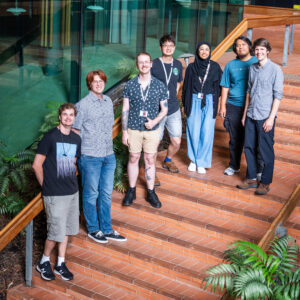Modern studies of microbial ecology are often data-rich since they involve the study of microbes in the context of their microbial community. Bioinformatics provides the statistical analysis, data science-based approaches and scalable computational toolsets necessary to study the structure and function of microbiomes.
The computational microbiology group led by A/Prof Ben Woodcroft aims to advance the science of microbial ecology in several ways:
Community profiling: which microorganisms are present in a sample? A simple question to ask, but not easy to answer, especially when most microorganisms are not known to science. Public databases now contain ~5 Pbp (5×1015 base pairs) of high quality shotgun metagenomic data, representing >700,000 weird and wonderful communities from across the planet. Our tools – SingleM, CoverM and Lyrebird – each tackle community profiling from different angles. The Sandpiper website provides results for all these data and allows users to rapidly identify samples containing specific species of interest.
Free software tools for microbial ecology: We focus on developing open-source software to be widely useful. For instance, Aviary can be used for extracting genomes from metagenomes, while Bin Chicken suggests which metagenomes to coassemble – we used it to recover the genomes of 24,000 new species (the ‘Rare Biosphere Genomes’). The group has released over 200 free software projects to date.
Evolution: We apply machine learning and gene/species tree reconciliation to understand microbial evolution across deep time, including viral evolution. In a recent Science study, we showed how machine learning can be used to calibrate the bacterial tree of life.
Climate change and soil microbiology: We study how microbial communities interact with — and are impacted by — climate change. Our work focuses especially on thawing permafrost in high-latitude peatlands, which store vast quantities of carbon currently locked in frozen soils but are warming at a rate faster than the rest of Earth.
There are usually openings for prospective students at all levels, so if you are interested in our work then please feel free to reach out via email.

Contact
Project themes
- Bioinformatic algorithm and tool development for microbial ecology
- Climate change and permafrost thaw
Selected publications
A full list of publications can be found at Google scholar. or through  ORCID. * indicates equal contribution.
ORCID. * indicates equal contribution.
- Ben J. Woodcroft*, Samuel T. N. Aroney, Rossen Zhao, Mitchell Cunningham, Joshua A. M. Mitchell, Rizky Nurdiansyah, Linda Blackall & Gene W. Tyson. Comprehensive taxonomic identification of microbial species in metagenomic data using SingleM and Sandpiper. Nat Biotechnol (2025). https://doi.org/10.1038/s41587-025-02738-1
- Ben J. Woodcroft*, Caitlin M. Singleton*, Joel A. Boyd, Paul N. Evans & Joanne B. Emerson et al. 2018, ‘Genome-centric view of carbon processing in thawing permafrost’, Nature, vol. 560, no. 7716, pp. 49–54, doi:10.1038/s41586-018-0338-1
- Rhiannon Mondav*, Ben J. Woodcroft*, Eun-Hae Kim, Carmody K. McCalley & Suzanne B. Hodgkins et al. 2014, ‘Discovery of a novel methanogen prevalent in thawing permafrost’, Nature Communications, vol. 5, no. 1, doi:10.1038/ncomms4212
- Carmody K. McCalley, Ben J. Woodcroft, Suzanne B. Hodgkins, Richard A. Wehr & Eun-Hae Kim et al. 2014, ‘Methane dynamics regulated by microbial community response to permafrost thaw’, Nature, vol. 514, no. 7523, pp. 478–481, doi:10.1038/nature13798
- Donovan H. Parks, Christian Rinke, Maria Chuvochina, Pierre-Alain Chaumeil & Ben J. Woodcroft et al. 2017, ‘Recovery of nearly 8,000 metagenome-assembled genomes substantially expands the tree of life’, Nature Microbiology, vol. 2, no. 11, pp. 1533–1542, doi:10.1038/s41564-017-0012-7
- Michael Imelfort, Donovan Parks, Ben J. Woodcroft, Paul Dennis & Philip Hugenholtz et al. 2014, ‘GroopM: an automated tool for the recovery of population genomes from related metagenomes’, PeerJ, vol. 2, pp. e603, doi:10.7717/peerj.603
- Caitlin M Singleton, Carmody K McCalley, Ben J Woodcroft, Joel A Boyd & Paul N Evans et al. 2018, ‘Methanotrophy across a natural permafrost thaw environment’, The ISME Journal, doi:10.1038/s41396-018-0065-5
- Inka Vanwonterghem, Paul N. Evans, Donovan H. Parks, Paul D. Jensen & Ben J. Woodcroft et al. 2016, ‘Methylotrophic methanogenesis discovered in the archaeal phylum Verstraetearchaeota’, Nature Microbiology, vol. 1, no. 12, doi:10.1038/nmicrobiol.2016.170
- Joel A Boyd*, Ben J Woodcroft* & Gene W Tyson 2018, ‘GraftM: a tool for scalable, phylogenetically informed classification of genes within metagenomes’, Nucleic Acids Research, vol. 46, no. 10, pp. e59–e59, doi:10.1093/nar/gky174
- Joel A. Boyd, Sean P. Jungbluth, Andy O. Leu, Paul N. Evans & Ben J. Woodcroft et al. 2019, ‘Divergent methyl-coenzyme M reductase genes in a deep-subseafloor Archaeoglobi’, The ISME Journal, doi:10.1038/s41396-018-0343-2